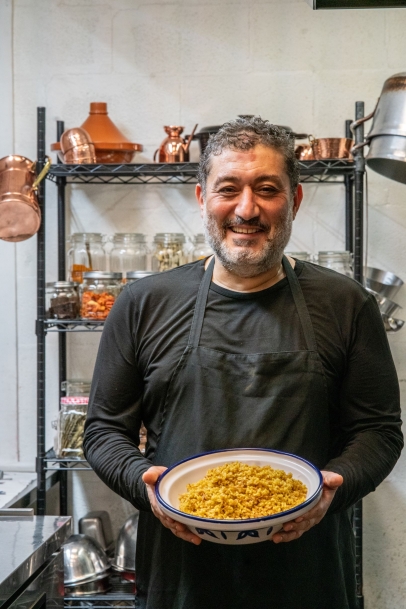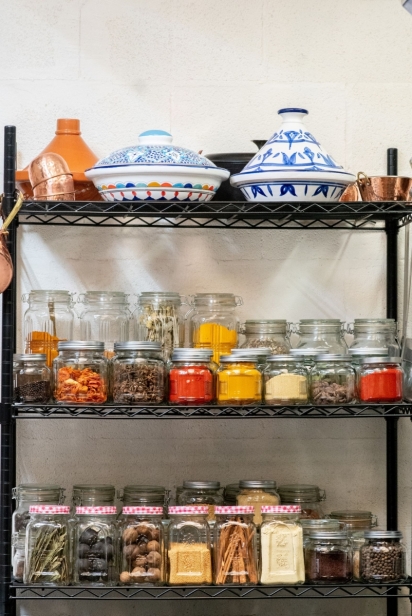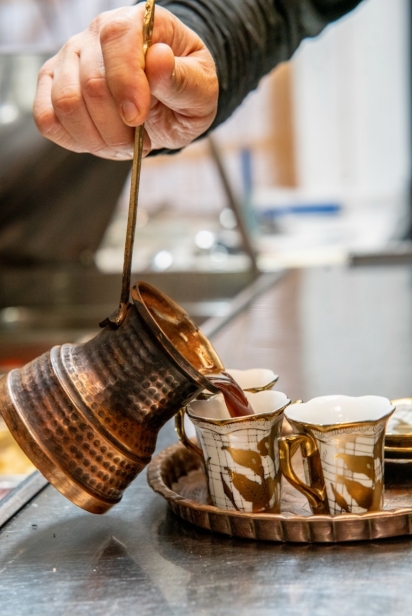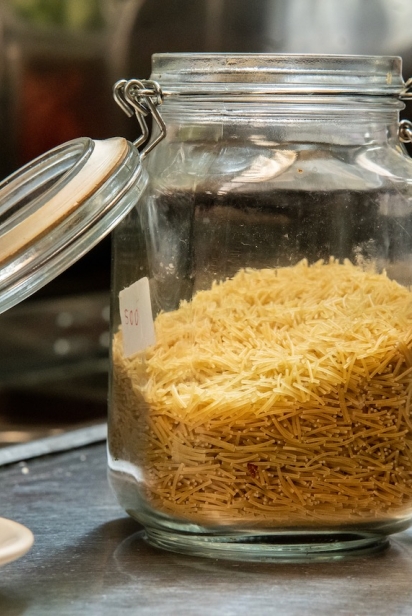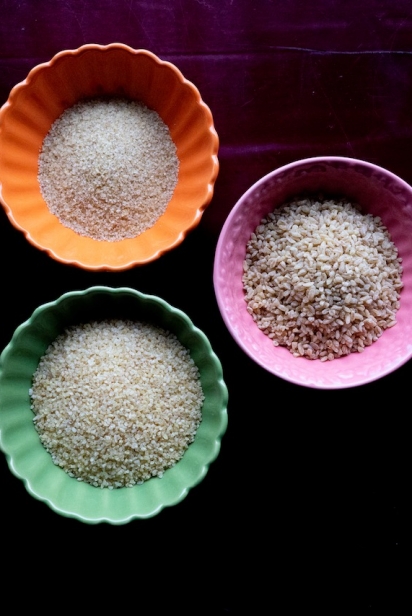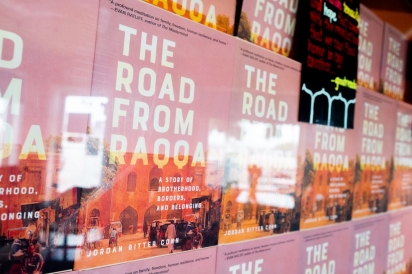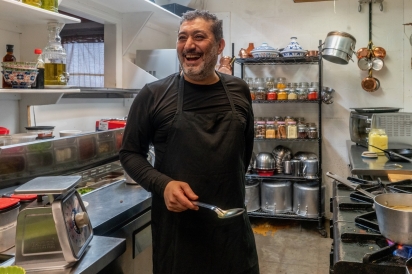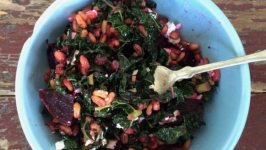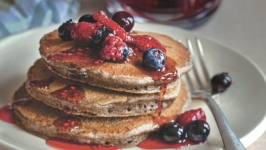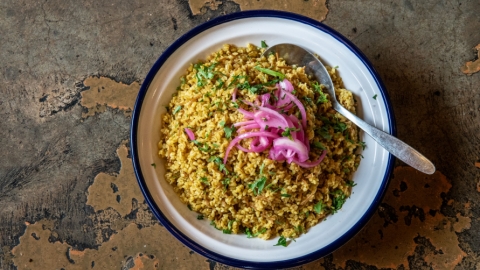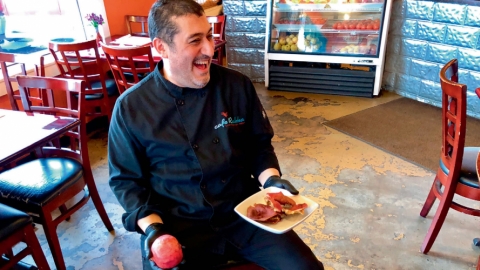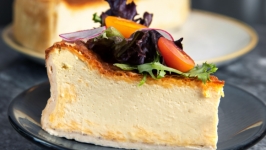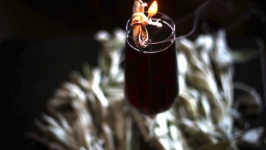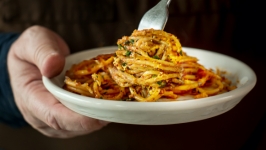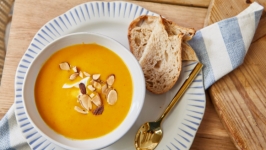The Sultan of Spice: Riyad Alkasem
Riyad Alkasem, aka ‘Chef Rakka,’ stands in the tight but tidy kitchen of Café Rakka in Hendersonville doing what he has done since 2007, preparing the authentic dishes of his native city of Raqqa in eastern Syria. Hummus, falafel, lamb chops, anything with eggplant -- all are iconic to his hometown on the banks of the Euphrates and all are specialties of the house. As he cooks, he suffuses each dish with an ever-present, aromatic liquid that sits beside the sizzling skillets atop the steady blue flames. It is the ‘spice water,’ a mix of lemon, vinegar, and the blend of spices appropriate to its season -- the spring blend, rich in wildflowers and wild herbs to promote blood flow; the summer blend, rich in spices to promote hydration; the fall blend, rich in spices to promote detoxification; and the winter blend, rich in immune system boosters.
“Every family has its own mix of spices,” Chef Rakka explains. “This is our mix, the ‘base’ as we call it. It’s handed down over generations. My grandmother never taught me how to cook. She taught me how to blend spices.”
Chef Rakka goes on to explain the centrality of the spices to his culture. “Over two thousand years ago, Raqqa was a trading post along the Silk Road. The flavors the spices convey are ancient. My own family has lived there for generations, since about 1500, making cheese and yogurt. For me, it’s a direct connection to the land and soil and people of my home. It gives me chills.”
The phone rings. Two regular patrons from nearby Nashville, a certain Mark and Abe, know about Café Rakka’s ‘secret menu’ -- a list of some half dozen dishes indigenous to Raqqa not on the regular menu -- and want to know if Chef Rakka has the time to make their favorite one, aysh burgul or cracked wheat. It takes about thirty minutes. The already busy chef gets even busier.
“Cracked wheat,” Chef Rakka comments, “is very basic. It’s in my DNA. I’m from the Fertile Crescent where wheat was first cultivated, irrigated by the waters of the Euphrates. Sort of like me.”
Chef Rakka expertly prepares the requested dish, the groats of wheat soaking up his family’s centuries-old blend of aromatic spices. A half hour later, the result is a classic taste of Raqqa, a staple dish that is simple for him to make, but difficult for him to do -- the very act of stirring the spice water into the wheat stirs up his memories as well.
“Every time I prepare this dish, it takes me to those smells of my boyhood,” he shares. “To that sand in the desert. To that mud along the banks of the Euphrates. It’s heavy,” he says with a sigh. “When I visited Syria in 2013, the only thing I could smell was the gunpowder. The loss of those old, familiar smells is what really bothered me the most.”
Chef Rakka is referring to Syria’s complex civil war. In 2011, the country erupted into a multi-sided conflict with factions fighting the Assad regime and often each other. Chef Rakka voluntarily returned to this cauldron to rescue his family, a true story rivetingly told in the book, The Road from Raqqa.
“It’s really hard for me to think that this is what’s left of us,” Chef Rakka continues. “We lost the city.” He refers to recent history when Raqqa briefly became the capital of the so-called “Islamic State” before being bombed into submission by an international coalition and then retaken by the dictatorial regime of Assad, the very regime that had driven Chef Rakka from Syria as a young man.
“[In Syria] I was a lawyer on my way to becoming a judge,” Chef Rakka says. “But I read about the system of checks and balances in the United States, about how three branches of government can prevent any one branch from becoming too powerful, can prevent anyone from becoming a dictator, so I immigrated to America.”
The self-described ‘institutional idealist’ arrived in the USA in the 1990’s with little more than a curious intellect, a deep faith, a strong work ethic, and an abiding injunction from his father to ‘make us proud.’ And so, Chef Rakka set out to do just that, working first as a dishwasher and then later as a manager at a high-end wine store in California even though he, as a devout Muslim, never drinks.
It was only much later, in 2006, that Chef Rakka struck upon the idea of opening an eastern Mediterranean restaurant in Hendersonville, the hometown of his American wife. He was determined to offer the authentic dishes of his ancient culture. Would the locals respond positively? The answer has turned out to be a resounding ‘yes!’
“People don’t discriminate about three things,” Chef Rakka observes, “art, music, and food. Well, I’m not an artist, and I don’t sing, but I can cook.”
And he can also extend the warm hospitality for which his culture is famous. For example, as the reality of COVID sank in, Chef Rakka began sharing his family’s special blend of tea called ‘Elixir Tea’ -- ‘axeer’ in Arabic meaning ‘secret of life.’
“I saw my grandfather giving away this tea in Syria and now I am doing it. This is what my heritage is about. We did nothing but open our homes and our hearts to any visitors. It made us proud to do so. And that’s why I feel such a sense of ambassadorship. This restaurant has become my gateway to show what city I’m from. To represent my culture. To represent Syria. To represent my religion in the best way and the most accurate way. For me, these have been the most honorable, enjoyable years of my life, serving people. It fits my culture. It fits my ancestors.”
It’s an ambassadorship that continues to build. “I am expanding the restaurant behind the kitchen,” Chef Rakka explains, “adding space for a small, pop-up kitchen for four to five couples once or twice a week that will only offer the dishes from my secret menu. If you don’t like it, don’t come, but it will be the most authentic, eastern Syrian food. Even the kabobs will be different. Sure, I have shawarma, but the Raqqa kabobs are different. I’m going to introduce people to my culture through the food. I was aspiring to change a country, but I did not realize I could help change a country through a skillet and plate of hummus.”
Read about Chef Rakka's journey to America in his new book, The Road from Raqqa. Available at caferakka.com.


